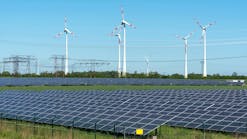Dominion Energy Prepares for Grid Challenges, Expands Solar in South Carolina
With more than 1000 MW of solar capacity on our system, Dominion Energy is working to power an increasingly clean future for South Carolina. But incorporating large-scale amounts of solar energy onto the grid — while continuing to provide customers with safe, affordable and reliable energy — is not without its challenges.
Solar is Key to Green Energy Growth
For most of its history, South Carolina’s power grid focused on large facilities that generate energy from coal, gas or nuclear sources. Today, Dominion Energy South Carolina is ranked second among Southeastern utilities in per capita solar generation, and solar power is a key factor in our broader company commitment to achieve net zero carbon emissions by 2050. The amount of solar capacity on the Dominion Energy South Carolina grid is more than 20% of our historic peak.
The amount of energy solar generators produce can fluctuate rapidly throughout the day as weather systems move across South Carolina. This fickle nature does not always align with a utility’s commitment to constantly meet customer demand. Although as much as 40% of the energy produced on Dominion Energy’s system in South Carolina comes from solar power on sunny summer days, the loss of solar production is nearly instantaneous when clouds cover a solar facility. During the winter months, peak demand for energy usually occurs in the early morning before sunrise.
Preparing for grid challenges
How does Dominion Energy meet these challenges? We respond with dispatchable supply-side resources that have quick start times and fast ramp rates. This includes mainstays like pumped storage and an increase in the use of quick-start internal combustion turbines.
Some solar facilities have begun proposing co-located battery storage so they can continue to output energy even when the panels are not collecting sunlight. Battery storage is a fast, flexible resource which can help maintain grid reliability. However, further advancement is needed before it can be utilized on a large scale.
Dominion Energy also maintains natural gas and hydro units in reserve, ready to increase production or connect to the grid as solar production decreases. Quick-starting internal combustion turbines will become more important during those times solar goes offline due to the weather. The company has begun work this year on a project to upgrade our aging peaking units with new, highly efficient turbines.
Solar Energy’s Upside
An upside of solar’s tendency to peak in the afternoon is that it can help relieve some of the need for larger, baseload generation units. In fact, solar on the Dominion Energy South Carolina system frequently generates more energy than the grid’s load requires.
When this happens, Dominion Energy can store some of the output in the Fairfield Pumped Storage facility. Located approximately 30 miles northwest of Columbia, South Carolina, the facility utilizes two reservoirs and acts as a giant battery. When we need to store excess energy from the grid, Fairfield Pumped Storage (Fig 2) pumps water from the lower reservoir into the upper reservoir. When customer demand returns in the evening as solar goes offline, the facility helps make up the difference by powering its turbines and returning the water back to the lower reservoir.
These challenges require an ongoing reassessment of all levels of electric infrastructure, standards, and operating protocols. As renewable generation grows, Dominion Energy is committed to maintaining grid reliability and resiliency.
Renewable energy — particularly solar — will remain an important energy source for clean energy in the transition to a more modern, resilient and clean energy grid. Dominion Energy will continue to be a leader in a sustainable energy future by generating and delivering clean energy safely, reliably and affordably in support of our customers and South Carolina’s growing, rapidly changing economy.



